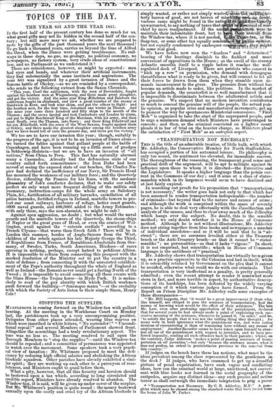- TOPICS OF THE DAY.
THE YEAR 851 AND THE YEAR 1851.
IF the first half of the present century has done so much for us, what great gifts may not lie hidden in the second half of the mu- tury ; but still more may we ask, whether we are prepared to mete by the gifts of the past thousand years the next thousand! To go back a thousand years, carries us beyond the thne of Alfred the Great, when the Danes were getting troublesome. No rail- ways in those days, no gas, no geology, no political economy, no newspapers, no factory system, very crude ideas of constitutional law, and no Parliament as we understand it !
There are coincidences, however, as might be expected : men had eyes and hands, and whatever their artificial instruments, they had substantially the same instincts and aspirations. The year 851 was signalized by a great invasion of Danes and the famous battle of Okeley,—as we are reminded by a correspondent, who sends us the following extraet from the Saxon Chronicle.
"This year, Ceorl the ealdorman, with the men of Devonshire, fought against the heathen Men at Wicganbeorg, and there made great slaughter, and got the victory. And the same year Xing Ethelstan and Ealchere the ealdorman fought on shipboard, and slew a great number of the enemy at Sandwich in Kent, and took nine ships, and put the others to flight : and the heathen men, for the first time, remained one winter in Thanet. And the same year came three hundred and fifty ships to the month of the Thames ; and the crews landed and took Canterbury and London by storm, and put to flight Beorhtwulf King of the Mercians' with his army, and then went South, over the Thames, into Surry and there King Ethelwulf and his son :Ethelbald, with the army of the West Saxons, fought against them at Ockley, and there made.the greatest slaughter among the heathen army that we have heard tell of unto the present day, and there got the victory."
We too are to have our invasion this year; though, suitably to the progress of the age, it is not to be an invasion of Danes alone- -we turned the tables against that gallant people at the battle of Copenhagen, and have been running up a little score of grudges in Schleswig-Holstein--but we are to have an invasion of "all nations, from China to Peru. This fact has naturally alarmed many a Cassandra. Already had the defenceless state of our country called forth remonstrance : the Iron Duke had been moved at seeing the exposed state of our beaches, Bir Charles Na- pier had declared -the inefficiency of our Navy, Sir Francis Head has mourned the weakness of our military force; and the Quarterly Review, ridiculing Sir Francis for his fears, with the sardonic pleasantry of deb's comforter declares, that to make our safety perfect we only want more frequent drilling of the militia and yeomanry, instruction-camps for the whole army on Salisbury Plain, &c., fortification of all military barracks, castellation of all police barracks, fortified refuges in Ireland, martello towers to pro- tect our coast railways, harbours of refuge, better coast guards, 5000 naval guards, and 400,000/. added to the Army Estimates : with only these, says the non-alarmist, we might be safe ! Against open aggression, no doubt ; but what would the naval guards and the martello towers of the Quarterly, the steam-ships of Napier or the great guns of Head, or even the armies of Wel- lington, avail against the "entente cordiale" according to a French Ulysses—that worse than Greek faith ? There will be in London this slimmer, hordes of Anglo-Saxons from the West, children of the rebels against his late Majesty George the Third, of Republicans from France, of Republican-Absolutists from Ger- many, of Swedes, Turks South Americans, Hindoos—of races agreeing in nothing, perhaps, except hatred to pefidious Albion. It IS impossible to refrain from connecting this prospect with the marked resolution of the Ministry not to put the country in a state of defence ; from connecting it with the nuresisted establish- ment of the Pope's authority throughout the whole of England as well as Ireland—the Romans never could get a footing North of the Tweed ; it is impossible to avoid connecting all these events with the Glass House—the Trojan horse—in Hyde Park. It is melan- choly, to read of the gay alacrity with which British workmen push forward the building-0 funemque menu "—or the credulity with which the Society of Arts listen to their simple Sinon, Henry Cole !


























 Previous page
Previous page